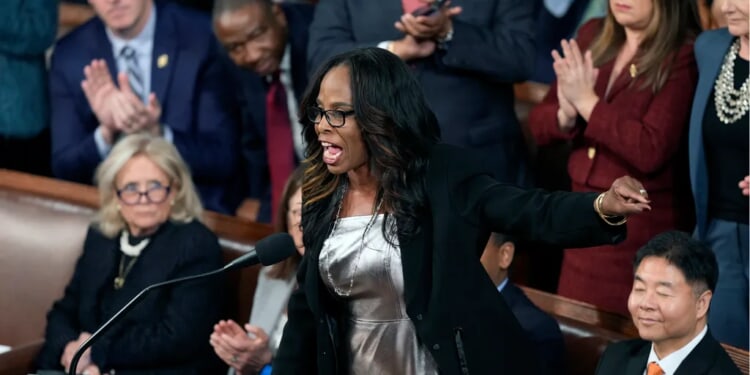DEMS CIRCLE WAGONS AROUND MEMBER WHO SOUGHT EPSTEIN’S COACHING. It was one of the more stunning moments of the recent political hysteria over dead sex trafficker Jeffrey Epstein. Thousands of pages of Epstein documents released by House Republicans revealed, among many other things, that a Democratic member of the House, Del. Stacey Plaskett of the Virgin Islands, had an extended text conversation with Epstein during a February 2019 hearing of the House Oversight Committee.
At the time, the hearing was huge news in Washington because the witness was Michael Cohen, President Donald Trump’s former attorney and fixer, who had turned on Trump and was accusing him of all sorts of wrongdoing. Democrats like Plaskett hoped that Cohen’s appearance would do some major damage to Trump.
Incredibly, Plaskett sought Jeffrey Epstein’s counsel. The Washington Post reported that Plaskett texted Epstein early in the morning on the day of the hearing, and “Epstein and Plaskett texted throughout the day.” When it came time for Plaskett to question Michael Cohen, Epstein fed her a question. He wanted Plaskett to ask about Rona Graff, Trump’s executive assistant, and Plaskett did as Epstein suggested.
Why in the world would a member of Congress be in real-time contact with Jeffrey Epstein during a hearing, and even take dictation from him? Plaskett would explain that she was just listening to “a constituent.” Remember that Epstein’s notorious private island, Little Saint James, was in the Virgin Islands. Plaskett explained that texting with Epstein was what politicians sometimes call constituent service.
It was all perfectly reasonable, Plaskett said. “So Jeffrey Epstein was a constituent,” she told CNN on Wednesday. “Like many constituents, individuals get your phone number, they text you about issues, they speak with you. I have spoken with him about issues that are relevant, things that are going on in the Virgin Islands and elsewhere around the country.” Note that Plaskett said “they text you,” but in fact, Epstein did not initiate the texting; Plaskett did.
Plaskett then tried to talk her way around the fact that she and Epstein were texting long after, 11 years after, Epstein pleaded guilty to sex trafficking an underage girl. Epstein was a well-known sex criminal. There was no way to claim ignorance of who he was. In 2019, five months after the texting, Epstein would be arrested again on sex trafficking charges, leading to his suicide in a jail cell in July 2019. Talking to CNN, Plaskett tried to obscure the timeline.
“I had received donations from him after the last investigation came out, which was after this texting,” Plaskett said, apparently referring to Epstein’s 2019 arrest. What that really meant was that Plaskett stayed in touch with Epstein long after his 2008 guilty plea and long after everyone knew he was a sex criminal.
Why do it? Plaskett, a former federal prosecutor, said she was just seeking “the truth.” “I believe that Jeffrey Epstein had information, and I was going to get information to get at the truth,” she said. At that point, CNN’s Pamela Brown asked whether Plaskett regretted getting in touch with Epstein on that hearing day. “At the time he was a known sex offender and it had been detailed all the sexual abuse,” Brown said.
Plaskett appeared unconcerned. “There are a lot of people who have done a lot of crimes,” Plaskett responded. “And, as a prosecutor, you get information from people where you can. I’ve interviewed confidential informants. I’ve interviewed narcotics, drug traffickers, and others. And that doesn’t mean that I’m their friend. That doesn’t mean that they are friendly with me. It means that they have information that I need, and I’m trying to get to the truth.”
Brown asked again: “So no regrets, basically, is what you’re saying?” “I’m moving forward,” Plaskett said. And that was that.
Throughout the day, other Democrats adopted the constituent service claim to excuse Plaskett’s behavior. Republicans were slamming Plaskett, said Democratic Rep. Jamie Raskin, “for taking a phone call from one of her constituents.” Who in the House hasn’t done that? “And I don’t think there’s any rule here against taking phone calls in a hearing,” Raskin added.
Other Democrats rushed to Plaskett’s defense when Republicans proposed censuring her. The House Democratic leader, Rep. Hakeem Jeffries, said criticizing Plaskett was “baseless and not credible.” Democratic Rep. Yvette Clarke called the GOP effort a “sham” and said Republicans would censure Plaskett “for a conversation from more than six years ago, which broke no rules and has no connection to any criminal activity.” House Democrats voted unanimously against the move to censure Plaskett.
It was a surreal scene. One can imagine if newly-released documents had revealed that Donald Trump, in 2019, was texting or in some other way having a conversation with Jeffrey Epstein, and that Epstein was actually dictating to Trump what he should say about some issue. Rep. Raskin would blow his top. Republicans would run for cover.
Obviously, Del. Plaskett is not the president. But in today’s atmosphere, people have suffered reputational hits for having less of a connection to Epstein. What the Plaskett episode shows is that Democrats will condemn Republicans 24/7 over Epstein but circle the wagons for one of their own.
















